Yorkshire Terriers are small dogs with larger than body personality.
They have human-like hair which is silky and shiny and adds up to the beauty of this breed.
The terrier group consists of varied dogs but one thing that they all have in common is the feisty, energetic and mischievous personality.
They make great apartment dogs because of their small size and some show line dogs have even won prizes.
If you’re looking for a feisty yet loving companion, Yorkshire terrier temperament is perfect for you.
Table of Contents
Quick Facts

Avg Weight: 7 pounds
Avg Height: 7-8 inches
Life Expectancy: 11-15 years
Dog Group: Toy group
Dog Ranking: 10/193 (America)
At A Glance
Size (1/5)
These are small sized dogs which belong to the toy group of dogs.
They can grow up to 8-9 inches by the shoulder.
The weight of each dog varies which makes it inconsistent.
One Yorkshire terrier puppy may weigh 4 pounds whereas other will be 6 pounds.
Yorkshire Terrier is one breed and it does not have types.
A “tiny Yorkie” breed doesn’t exist. Don’t get fooled by breeders.
Affection Level (4/5)
They are highly affectionate dogs.
They will start following any little thing that catches their attention.
Although they show affection towards their owners and family members, they are very likely to bark when they see a stranger roaming around.
Apartment Friendly (5/5)
Absolutely apartment friendly.
Yorkies are small dogs but have an energy filled in them.
They are suited in an apartment perfectly.
Cold Weather Tolerability (2/5)
A Yorkshire is equipped with only one coat which is not enough to regulate the body during cold temperatures.
Temperatures till 7°C are suitable for them.
But if the temperature drops below that, you will notice shivering and you would want to cover them with coats or sweaters.
Hot Weather Tolerability (2/5)
Because of their single coat hair, it is difficult for them to sustain extreme heat.
Temperatures above 29°C may turn to be harmful to your Yorkie.
Keep your dog cool in summers using cooling mats or keeping them in a comparatively cooler temperature.
Barking Tendencies (4/5)
Often the barking of a Yorkie will be high pitched, attention-grabbing and loud.
Yorkie has high barking tendencies.
Because Yorkshire is an active dog, it needs to get enough exercise and room to roam around the house.
It starts barking only when its energy has been repressed.
One point that you must keep in mind while the dog barks are you should not reinforce it.
If you obey their demands then it is likely to start barking again to ask for that thing.
Cat Friendly (3/5)
The plus point in keeping a cat with a Yorkie is their size.
They are similar in size which means that they aren’t going to be under threat or anger.
Socialization of these both pets takes around 2-3 weeks.
Their interactions should always be supervised.
When going out, keep them out of each other’s reach.
Dog Friendly (4/5)
It gets along with other dogs but as it is a small-sized dog, it is natural for them to be scared of large dogs.
Exercise Needs (5/5)
Most of its exercise is completed indoors by roaming around in the house.
But you should still give him/her an exercise for about 20-30 minutes outdoors.
Grooming Needs: (4/5)
Shedding is less in this breed.
You can decide to keep them with their long hair or chop them off.
Playfulness: (4/5)
It may seem small in size but is filled with lots of energy.
It is energetic and will get along with you if you start playing with her.
It likes being playful and gets along with children.
But do not leave young children alone with the Yorkie unsupervised.
Trainability (3/5)
It is difficult to housebreak a Yorkie.
Consistent efforts to follow up your dog with appropriate training measures will make him well behaved and well trained.
Intelligence (3/5)
It ranks among the least intelligent dogs.
This means it needs at least 15-25 repetitions to start following instructions.
Mouthiness (2/5)
They do not have traits of chewing, nipping or biting.
Only if their exercise needs aren’t met then they will search for something to chew on.
They may also start chewing if they are bored.
It is essential for you to keep them busy.
Price group (3/5)
Buying a Yorkie from a breeder may cost approximately $1500- $2000.
Yorkie breed puppies for sale may range from $500- $3500.
It depends on the breeder as well as the type of Yorkie.
If the Yorkshire pup is from a family whose grandparents and parents have won prizes in the show ring, then the cost may range up to $10,000.
About Yorkshire Terriers
The American Kennel Club describes a Yorkshire Terrier to be affectionate, tomboyish and sprightly.
It looks charming with its silky hair.
Terriers were bred to hunt and dig up places.
Where Yorkshire Terriers Came From?
The history of a Yorkie takes us back to England where it was bred to catch rats in the mills.
The ancestors of this breed are Waterside Terriers.
They had long blue-gray haircoat and were small in size.
This breed was known as Broken-Haired Scotch Terrier before it came to be known as Yorkshire Terrier.
In the present times, it is seen as an ornamental or fashion accessory rather than being used for hunting or digging up.
Size
Yorkshire Terriers can grow up to a height of 7-8 inches and weigh not more than 7 pounds.
This makes it similar to Chihuahua but comparatively, they are still heavier and taller than Chihuahuas.
“Teacup Yorkie” or “Tiny Yorkies” is a myth.
Run away from breeders who claim to sell such breeds.
Trainability
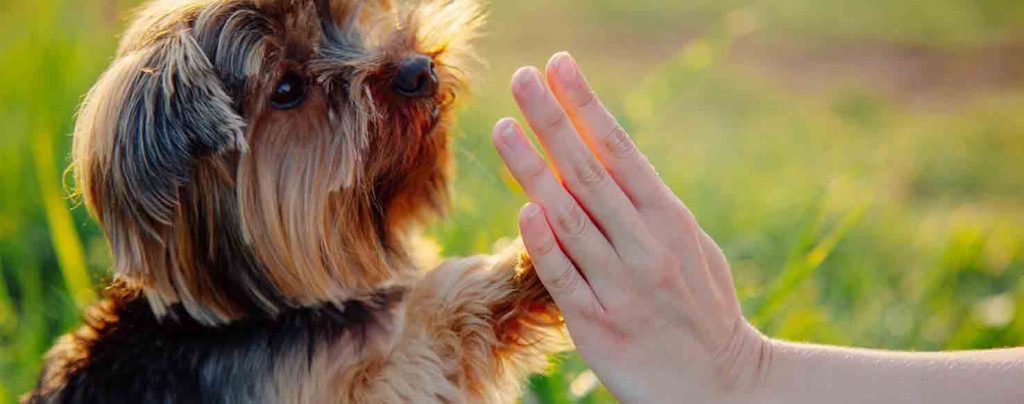
Are Yorkies hard to train? Well, yes.
These dogs have less attention span which makes it difficult for them to follow what’s going on in the training.
Their training should start as early as 7-8 weeks old.
Start with some short training sessions with basic commands.
Their training involves four main aspects which should be followed.
They involve Basic commands Training, Clicker Training, Respect Training, and Potty training.
The clicker is an instrument which creates a noise.
This noise has to be associated with positive reinforcement for the dog.
Give them a treat or reward if they are successful in following the noise.
Do not mistake the clicker to be a toy which grabs the attention of your dog.
Respect training involves giving them both negative and positive reinforcement.
Do not hurt your dog.
Negative reinforcement can be shown using facial expressions, body language, and change in voice.
Color & Grooming
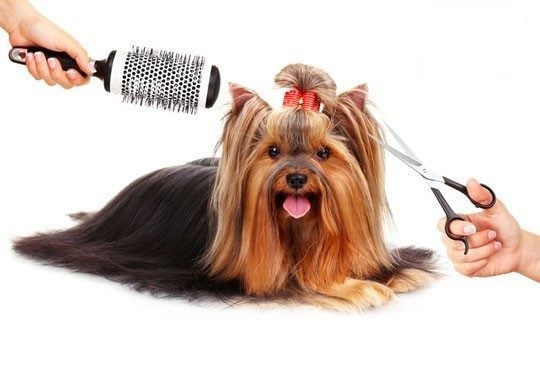
AKC recognizes five color categories for yorkies:
• Black and tan
• Black and gold
• Blue and tan
• Blue and gold
• Parti (black, white and tan)
Yorkies are famous for their silky soft coat.
Their hair is similar to that of human hair.
It either comes off while brushing or sheds when it becomes weak.
This breed has a single-layered coat which consists of hair and not fur.
If you want to stay away from cleaning car seats and sofa seats full of fur then this is the perfect dog breed for you.
The hair above their eyes should be tied into a bow so that there is no irritation in the eyes.
Their ears have to be cleaned with wet cotton regularly to avoid infections.
Keep an eye on their skin beneath the hair.
Regular checking helps monitor their skin infections or rashes.
Although their hair seems to like that of humans, do not try to bathe them with human shampoos.
Use dog shampoos and bathe them twice every three weeks.
If they have short hair, bathing even once in three weeks will be sufficient.
Common Diseases And Health Conditions
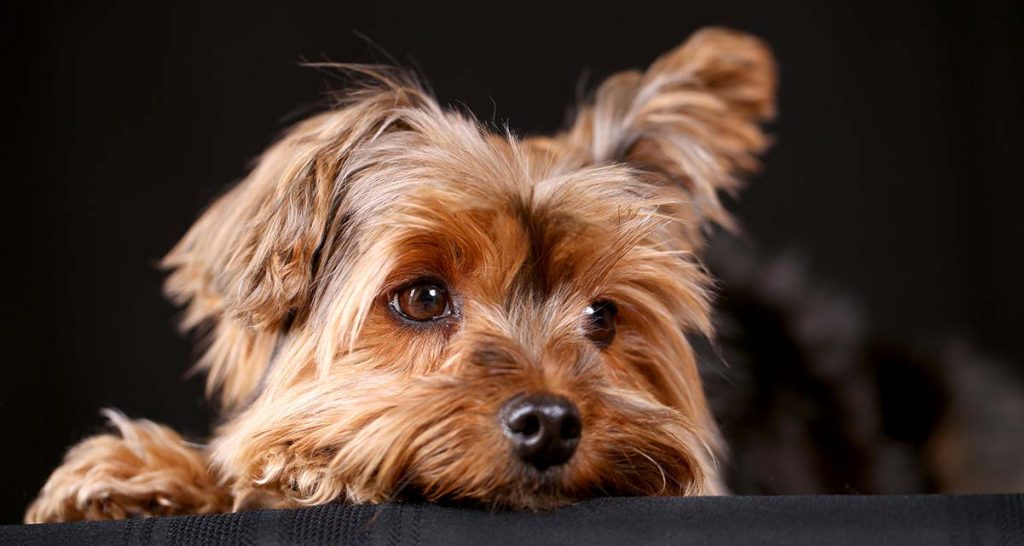
Hypoglycemia:
Low level of blood sugar causes hypoglycemia in toy breeds.
This causes the dogs to faint, it harms the motor abilities and functioning of the brain.
It is generally seen in puppies lesser than eight months old or in adults whose livers have stopped functioning properly.
One short term solution to this maybe rubbing honey or sugar syrup on the gums of your dog.
Don’t let your pup skip any meals. Provide enough dry kibble other than meal hours so that sugar level is retained.
TARGETING THE BONES
Legg- Perthes:
This disease targets the hip joint. Less circulation of blood in that area makes it weak and leads to the collapse of the joint.
You may notice your dog limping, the leg going lame or crying out of pain.
Generally puppies around the age of 5 to 8 months are prone to Legg- Perthes.
Luxating Patella:
The kneecap gets dislocated in this condition.
The kneecap may even come out of its body which is extremely painful.
Generally, happens to adult dogs.
You must take them to the vet in case your dog shows symptoms of pain.
TARGETING THE EYES
Retinal Atrophy:
This health condition is classified as being genetic.
It causes bilateral retinal degeneration.
This can lead to partial or complete blindness in the dog.
Check this condition with a vet within 2 months of the dog’s age as this targets young ones.
Cataract:
The vision becomes blurry and unclear when dogs get a cataract.
They will not show any symptoms of pain.
They may fear to go into dark places because of unclear vision.
TARGETING RESPIRATION
Collapsed Trachea:
The trachea reduces its size, gets narrow and causes respiratory problems.
Toy breeds are prone to this disease because of their small size.
Surgery is available to cure this problem.
Symptoms include difficulty in breathing, panting, coughing or noisy breathing.
TARGETING THE SKIN
Skin Infections:
Due to the long hair that this breed possesses, the skin is often hidden beneath their hair.
It is a perfect attraction for insects, fleas, and dirt.
Keep an eye on allergies and give them the trim if it’s needed.
Feeding
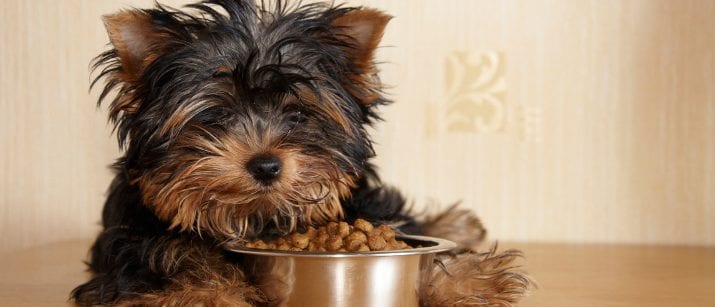
Puppies should be fed four times a day.
They have high nutritional needs than the adult dog.
Dry kibble is the best food for your dog in case he gets a stomach upset issue or when you want to provide him a staple diet.
There are some homemade foods that you can include in your Yorkie’s diet.
You can include meat such as lean chicken, lamb, turkey, fish, bison.
Vegetables such as spinach, carrots, string beans, and sweet peas can be given.
Fruits like banana, raspberries, mangoes, and blueberries would help in building energy.
½ to ¾ cup dry food is recommended daily for a dog until he ages 3 months.
You may start having meals with them but there are some human foods toxic for dogs.
Keep in mind these toxic foods and avoid giving them these.
Suggested: Senior Dog Food
Vaccination and Care
Vaccinations for a Yorkshire terrier puppy should start at eight to ten weeks of age.
Boosters can be given a year later after the vaccinations.
According to the American Animal Hospital Association (AAHA), there are four vaccinations which are necessary for a puppy.
They are parvovirus, hepatitis, distemper, and rabies.
Do not over-vaccinate your puppy.
Ask your vet as to what schedule to follow with respect to giving vaccinations to your Yorkie.
Suggested: Guide To Dog Vaccination
Monthly Expense Estimation
If you choose to buy a Yorkshire terrier, it will approximately cost the following depending on where it is found:
Yorkshire terrier on Sale from a breeder: $1500- $2000
From an animal rescue or shelter: $50- $100
Dog license: $5 -$30 (renewed every year)
Dog food may cost approximately $8- $25 per month.
Estimating the medical cost per visit to be $50.
One-time spending includes crates, leashes, dog cooling mats, food bowls, dog shampoos or other miscellaneous items.
Before you bring home a puppy or a rescued animal make sure that you will be able to take care of them.
New dog checklist lists all the point you should consider before you take the step of bringing home an adorable tail-wagger.
Behavior With
Children
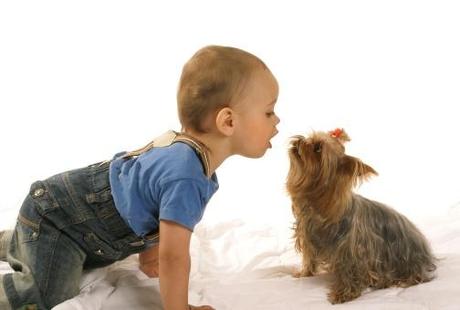
Yorkies are friendly dogs.
Them being with children should follow supervision from the parent.
Yorkies are not really kids’ dog because if the child is not taught how to handle a dog then it may end up breaking bones of the poor dog.
Some Yorkshire terrier breeders don’t sell Yorkies to people with small children.
Appropriate manners should be taught to the child when handling a pup.
Dogs
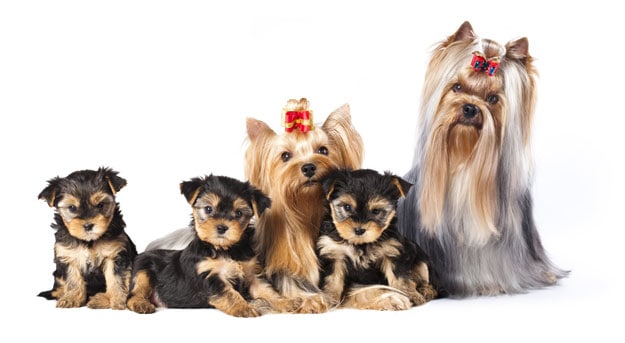
Yorkies get along with other dogs.
They are friendly but bringing another dog in your household will be a challenge.
However, if the dog is someone from the neighborhood then it doesn’t intend on harming provided that the other dog is quiet too.
When you are introducing them to another dog for the first time, make sure it is supervised.
Cats
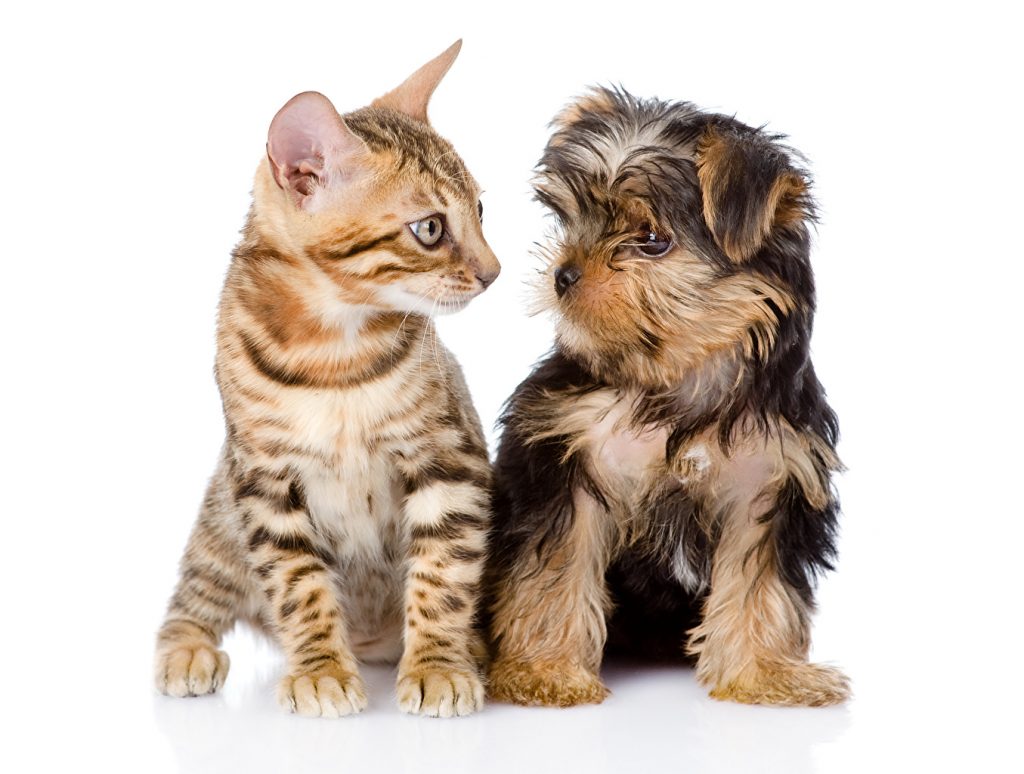
Early socialization and evaluation of both the pets will give an insight as to will they get along after staying together.
Cat foods should be kept away from your pup.
It contains more protein than the dog’s food.
Eating it once or twice won’t be harmful but long-term consumption will create health issues.
Keep them both held by leash during their socialization period.
Keep their interaction time low at first and then gradually increase as they get comfortable with each other.
Ignoring each other means that the other one does not appear as a threat.
Overview
Yorkies can be your small bundles of joy with very less attention needed for grooming.
You have to pay attention to their exercise routines as they are known to be active dogs.
Feed them well to avoid health problems and we have heard from dog owners that it is really intelligent when it comes to following commands.
If you live in an apartment and would love to have a companion following you around the house, you should consider a Yorkie for your home.
Fun Facts
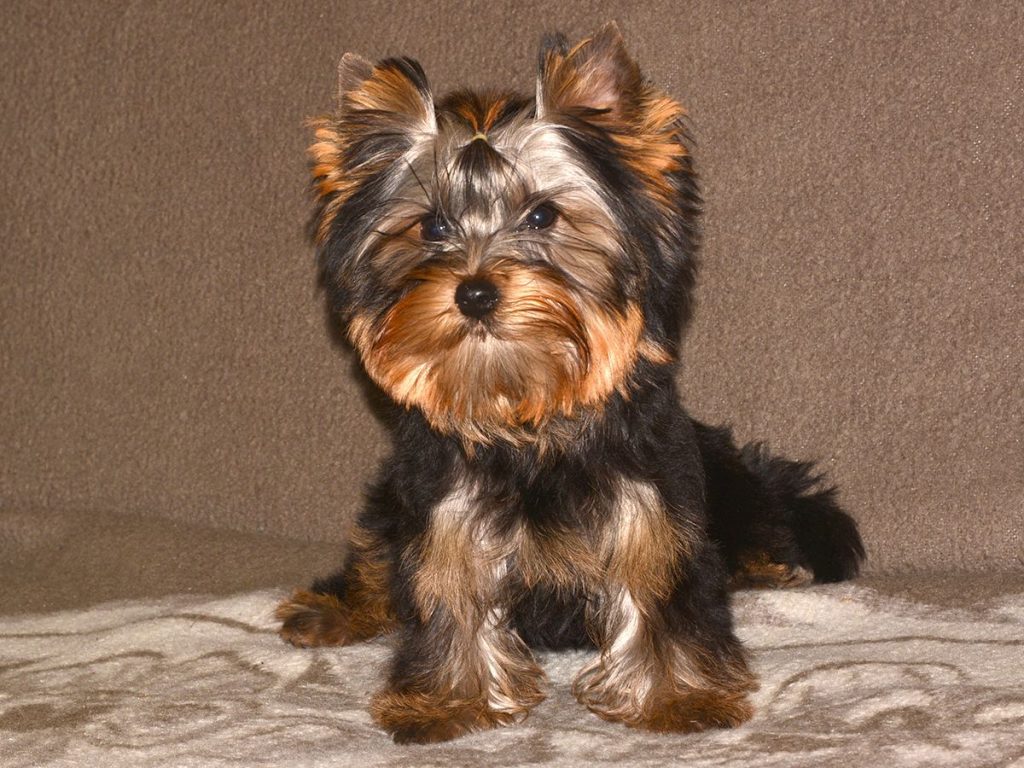
Huddersfield Ben is considered to be the father of this breed.
He weighed 11 pounds and used to be a confident competitor in the dog shows.
He won over 70 awards and was a champion in ratting. He left behind his amazing legacy.
Hope you enjoyed reading this article!
Consider Yorkie adoption before buying it from a breeder.
Let us know all your Yorkie stories in the comment section.
Happy Petting!



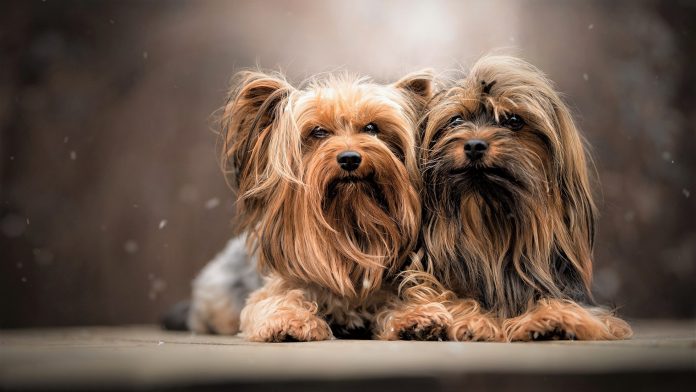









[…] Yorkshire Terriers are the most popular toy sized breed in the U.S., making them a perfect positive reinforcement for children who’re unfortunately confined to a hospital. […]
[…] Yorkshire Terriers are compact sized and bubbly creatures, and who solely serve the purpose of companionship. […]
[…] Yorkshire Terrier […]
[…] Yorkshire Terrier […]
[…] makes them not suitable for an apartment. Even though they are not a hyperactive breed of dogs like Yorkshire terrier, yet need space to stretch out their enormous […]
[…] Yorkshire terriers […]
[…] – 04:10 (https://dogisworld.com/dog-breed/pomeranian/) Yorkshire Terrier – 04:44 (https://dogisworld.com/dog-breed/yorkshire-terrier/) German Shepherd Dog – 05:20 (https://dogisworld.com/dog-breed/german-shepherd/) Dachshunds […]
[…] Yorkshire Terrier […]